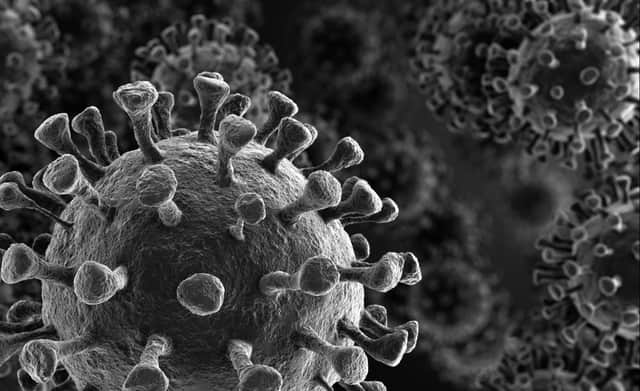This is how long coronavirus can live on surfaces outside the body


Like many other coronaviruses, the Covid-19 strain is often spread through the air in tiny droplets from the noses and mouths of infected people.
Advertisement
Hide AdAdvertisement
Hide AdEach cough can fire around 3,000 droplets onto other surfaces. The droplets can land on the surfaces themselves, or be carried there by unwashed hands that were used to cover the cough.
The virus can be spread to dozens of commonly touched surfaces, like desks and tables, computers, phones and stationery - as well as door handles and light switches.
Healthy people can then contract Covid-19 by touching the surface with their hand and then later touching their face, nose, or mouth with the same hand.
Studies on other types of coronavirus, like Sars and Mers, discovered that the viruses can survive outside the body for up to nine days at normal temperatures - and for four weeks in cold climates.
Advertisement
Hide AdAdvertisement
Hide AdBut scientists are still not sure exactly how long Covid-19 can survive on surfaces outside of the body.
Nevertheless, health officials are taking the threat posed by contaminated surfaces seriously, and urging people to wash their hands thoroughly with soap and water to kill the virus and prevent it spreading onto other surfaces.
Coronavirus: the facts
What is coronavirus?COVID-19 is a respiratory illness that can affect lungs and airways. It is caused by a virus called coronavirus.
What caused coronavirus?The outbreak started in Wuhan in China in December 2019 and it is thought that the virus, like others of its kind, has come from animals.
Advertisement
Hide AdAdvertisement
Hide AdHow is it spread?As this is such a new illness, experts still aren’t sure how it is spread. But.similar viruses are spread in cough droplets. Therefore covering your nose and mouth when sneezing and coughing, and disposing of used tissues straight away is advised. Viruses like coronavirus cannot live outside the body for very long.
What are the symptoms?The NHS states that the symptoms are: a dry cough, high temperature and shortness of breath - but these symptoms do not necessarily mean you have the illness. Look out for flu-like symptoms, such as aches and pains, nasal congestion, runny nose and a sore throat. It’s important to remember that some people may become infected but won’t develop any symptoms or feel unwell.
What precautions can be taken?Washing your hands with soap and water thoroughly. The NHS also advises to cover your mouth and nose with a tissue or your sleeve (not your hands) when you cough or sneeze; put used tissues in the bin immediately and try to avoid close contact with people who are unwell. Also avoiding touching eyes, nose and mouth unless your hands are clean.
Government adviceAs of Monday 16 March the government advised that everyone should be observing social distancing - avoiding unnecessary travel and working from home where possible. Anyone with a cough or cold symptoms now needs to self-isolate with their entire household for 14 days.
Advertisement
Hide AdAdvertisement
Hide AdThe government has also advised against going to the pub, out for dinner or partaking in any socialising with large groups. This has caused a number of closures across the country. Schools will close from Friday 20 March for the foreseeable future and exams have been cancelled.
The over 70s or anyone who is vulnerable or living with an underlying illness are being asked to be extra careful and stay at home to self-isolate. For more information on government advice, please check their website.
Should I avoid public places?The advice now is to avoid public places and any non-essential travel. Travel abroad is also being advised against for the next 30 days at least, and many European countries have closed their borders.
What should I do if I feel unwell?Don’t go to your GP but instead call NHS 111 or look online at the coronavirus service that can tell you if you need medical help and what to do next.
Advertisement
Hide AdAdvertisement
Hide AdWhen to call NHS 111NHS 111 should be used if you feel unwell with coronavirus symptoms, have been in a country with a high risk of coronavirus in the last 14 days or if you have been in close contact with someone with the virus.
Sources: World Health Organisation and NHS